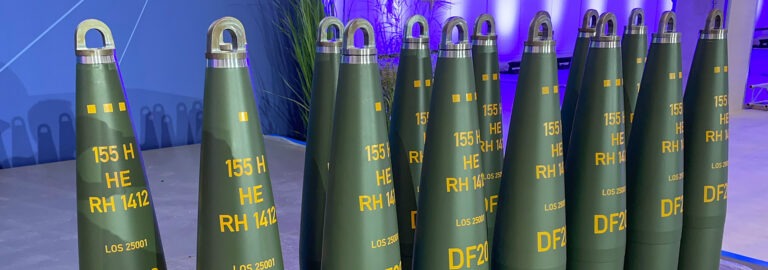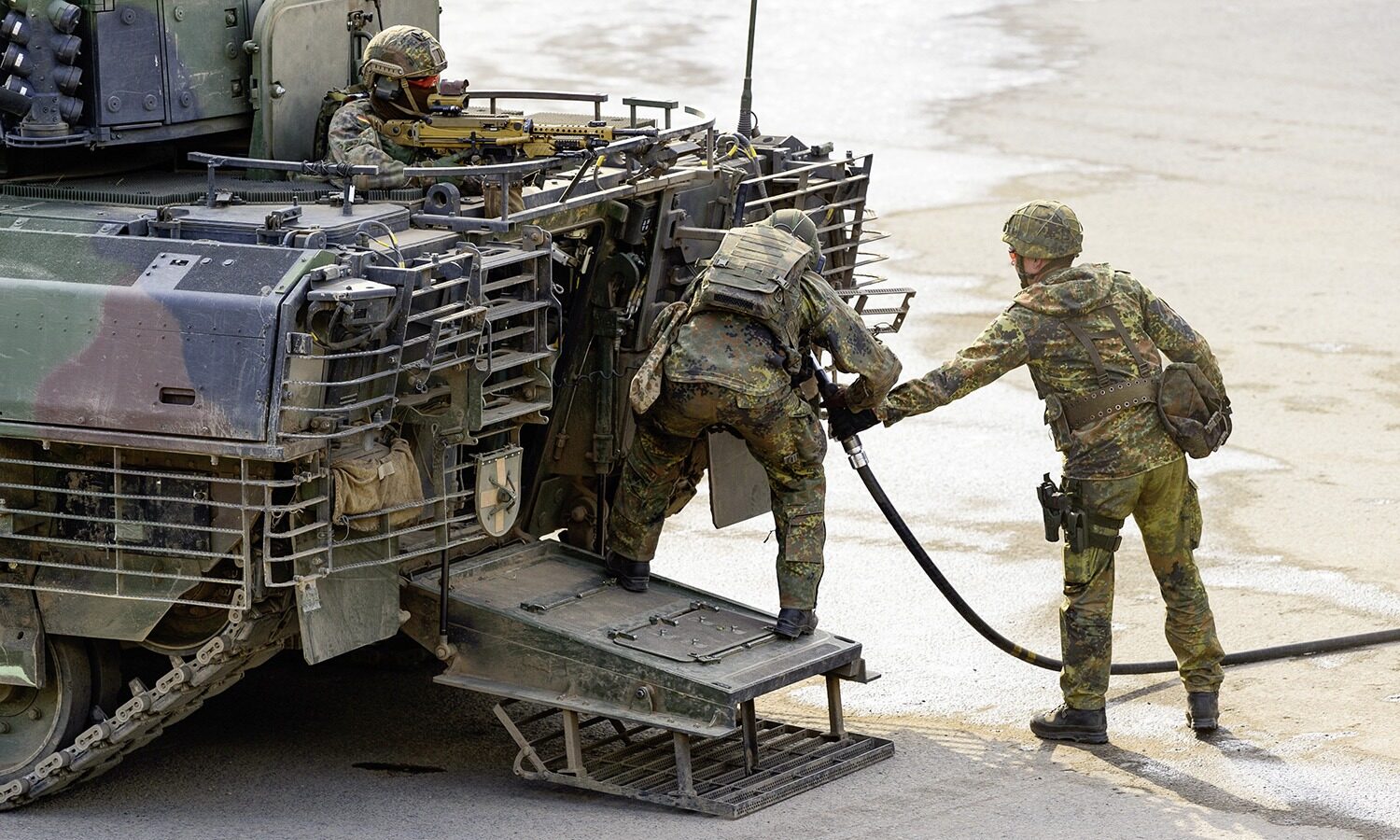
155mm in the spotlight
4. November 2025

25. August 2025
Military operational readiness requires a resilient energy infrastructure. In the event of an invocation of the EU’s mutual defence clause or NATO’s Article 5, European nations can ill afford to rely on fragile supply chains for fossil fuels. So why not instead produce e-fuels on a large scale independently and locally? This is about a vision beyond the ordinary.
Power-to-X (PTX)
incorporates all processes that convert renewable electricity into gaseous or liquid energy carriers. The “X” refers either to the energy form (e.g. gas, liquid, heat) or its intended use (e.g. fuel, chemicals, ammonia).
The Ukrainian war shows that energy is a critical military capability. When key fuel depots and supply chains are attacked, tanks are left stranded due to a lack of fuel. Also, the power supply is frequently and heavily targeted: power plants, transformers, and grid networks. At this stage, more than half of Ukraine’s energy capacity has been destroyed or severely damaged, with devastating effects on both the population and the economy.
National Resilience
If Germany and the allied NATO partners in Europe want to avoid strategic vulnerabilities within their own ranks in the future, new disruptive approaches to energy supply are needed – approaches that enable greater autonomy, diversification, and geographical distribution. Otherwise, achieving a high level of overall national resilience would not be possible, says Shena Britzen, head of the Hydrogen Programme at Rheinmetall. “We need to think in terms of logistics”, emphasises the energy and military expert, “and we need to think on a large scale”. Rheinmetall’s approach is a European network made up of several hundred decentralised production facilities for synthetic fuels, each with an annual output of between 5,000 and 7,000 tonnes.
Rheinmetall’s project vision: Giga PtX
“Electricity, water, and CO₂ – that’s all it takes to produce so-called e-fuels”, says Britzen. Each facility in the Giga PtX network is designed to operate autonomously, powered by locally generated renewable energy from sources such as solar, wind, or geothermal. The plants are equipped with in-house electrolysis systems for hydrogen production, carbon capture technologies to extract CO₂ from industrial emissions, and reactors for synthesising diesel or kerosene. In this project, Rheinmetall is working in close
partnership with INERATEC, a spin-off from the Karlsruhe Institute of Technology. The Badenbased
company is the global market leader in advanced, modular power-to-liquid systems.

Sustainable Kerosene
Sustainable aviation fuel (SAF) are the first step towards a climate-neutral future in aviation. From January 2025, EU regulations require at least 2 percent of aviation fuel to consist of SAF. By 2030, the addition of at least 1.2 percent of synthetic fuel (e-fuels) will also be mandatory. Both targets will be elevated in five-year intervals until 2050 – reaching 70 percent SAF and 35 percent e-fuels. Currently, according to the environmental organisation Transport & Environment, SAF accounts for less than 0.5 percent of total aviation fuel use.
20.5 million tonnes of fuel per year
What makes e-fuels particularly attractive for the armed forces is their availability during times of conflict. Unlike HVO100, a diesel fuel derived from hydrotreated vegetable oils, now available at civilian fuel stations, the raw materials needed for e-fuels can still be sourced in sufficient quantities even in wartime. In 2024 alone, Germany emitted around 650 million tonnes of greenhouse gases. “CO₂ is available in abundance and at low cost”, says Britzen. “For every kilogram of fuel, we only need three to four kilograms of CO₂.” According to Rheinmetall’s calculations, the Giga PtX network could produce 20.5 million tonnes of e-fuels annually for Europe, which is precisely the volume needed to cover fuel demands in a collective defence scenario. “Germany’s share in the project is set at 5 percent”, Britzen adds. “That corresponds to an annual output of around one million tonnes – far more than the Bundeswehr requires in peacetime.”
This overcapacity could be sold on the open market, allowing the Government to recoup the initially high investment costs. One of the major advantages of synthetic e-fuels is their compatibility with existing vehicle and aircraft fleets, both civil and military. These so-called drop-in fuels can be used without technical modifications, or, in the case of older systems, with only minimal additives. And demand is set to increase – especially in aviation. Since 2025, flights departing from Europe are required to blend a climate-friendly fuel alternative in their kerosene.
Energy autonomy through e-fuels
Rheinmetall and its technology partners could implement the Giga PtX concept across Europe within five to ten years. This is made possible by the modular design of the production units. Once the prototype facility has been finalised and dimensioned, it can be replicated quickly and efficiently. The required technologies are already well-engineered and proven in practice. While the overall project cost is expected to be in the three-digit billion range, these investments can be more than amortised over the lifetime of the facilities. “Our vision isn’t the cheapest solution”, says Britzen, major in the Bundeswehr Reserve. “But it is the fastest and most resilient path to fuel readiness in a defence context.” The fully self-sufficient production sites require no connection to the public power grid and can be established literally anywhere – ideally nearby military units or existing pipeline systems. This decentralised deployment significantly reduces their vulnerability to attack.
Moment of deterrence
With a PtX project of this scale, Rheinmetall is entering a new and largely unrivalled market. The defence corporation is currently in discussions with numerous ministries of defence to convince them of the extraordinary idea. In addition to the project’s high resilience and amortisation, Britzen emphasizes another compelling argument – deterrence: “The message to our adversaries would be substantial: we Europeans can produce our own fuel. Our energy supply is secure, even in times of war”.
Click here to receive push notifications. By giving your consent, you will receive constantly information about new articles on the Dimensions website. This notification service can be canceled at any time in the browser settings or settings of your mobile device. Your consent also expressly extends to the transfer of data to third countries. Further information can be found in our data protection information under section 5.